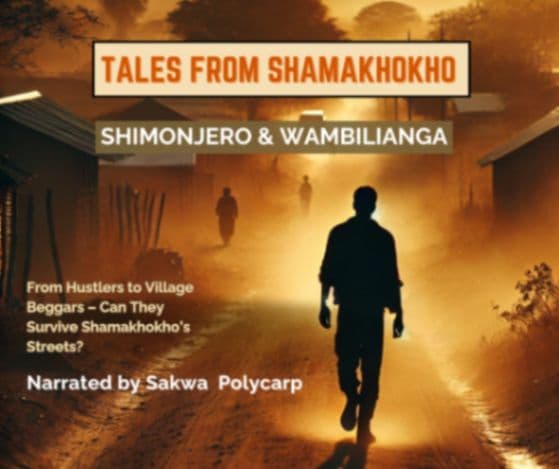I was still hiding in the bushes, licking my wounds and plotting my comeback when I heard footsteps.
My heart stopped for a second. Had the villagers sent someone to finish me off?
I held my breath.
Then a low voice whispered, "Shimonjero, don’t run. It’s me, bazuu."
I narrowed my eyes through the leaves to see who it was. Wambilianga. My childhood friend. The only man who could smile while being chased by an angry mob.
"Shimonjero, you are a legend in Shamakhokho. They say you ran faster than a government officer after misusing funds!" he laughed.
I shot him a look. "Wambilianga, stop joking. I almost died."
"Relax, my friend. I didn’t come to laugh at you. I came with a plan. A real one this time."
I should have walked away. After my last business venture—the great chicken investment disaster—I had sworn off money-making schemes. But my stomach was empty, and my pride had already been beaten by life.
"What plan?" I asked, against my better judgment.
Wambilianga grinned. "We become beggars."
I frowned. "Do I look like someone who can sit by the roadside and beg?"
He waved his hand. "Not ordinary beggars. Smart ones."
And that’s how we ended up pulling one of the greatest beggar scams in Shamakhokho history.
We positioned ourselves near the local market, where tourists sometimes passed by. Wambilianga wrapped his leg in a dirty bandage and sat on the ground, groaning like a man at death’s door. I stood beside him, playing the concerned friend with an “offerings” cup in hand.
"Madam, this man was a promising footballer before a reckless boda boda knocked him down. His family abandoned him. Now he can’t even afford painkillers."
A mzungu tourist stopped, eyes full of pity.
"Oh my! That’s so sad!" She reached into her bag and pulled out something heavy.
She placed a big bag next to Wambilianga as she spoke kindly, offering words of encouragement. But while she saw two struggling men, we saw an opportunity. Sticking to our plan, we smoothly swapped her bag with an identical one filled with old cartons.
If a tourist was walking around with a huge bag, we knew it was carrying something valuable.
She handed us a small donation—just Ksh 100—but that wasn’t the jackpot. The real prize was the heavy bag she left behind. We forced smiles, nodding as she walked away. Once she was out of sight, we packed up our beggar act and left.
But we weren’t fools. We had to be sure no one was watching.
Once we reached a safe spot, we opened the bag.
Stacks of new banknotes stared back at us.
Our jaws dropped.
"Shimonjero, we are rich, buda!" Wambilianga whispered, his hands shaking.
This called for a celebration.
And what better place than Mama Atoti’s hotel?
For months, we had walked into this place like hungry hyenas, always counting coins and negotiating for extra soup. But today? Today was different. We sat at the high table, chests out, like men who had just signed government tenders.
"Mama Atoti, bring four plates of ugali and three kilos of nyama choma!" Wambilianga ordered, slapping the table.
Mama Atoti squinted.
"Wambilianga, Shimonjero… Leo mmeomoka aje?"
"Mama Atoti, we are investors," I said, tapping my stomach.
The food arrived. We ate like men who had never known suffering. We chewed meat without fear, washed it down with cold sodas, and wiped our mouths with serviettes like Nairobi people.
"From today, we only eat like this," Wambilianga declared, biting into a juicy bone.
Mama Atoti watched us, half-smiling, half-suspicious.
Then came the moment of truth.
Bellies full, we leaned back, savoring our victory. Wambilianga wiped his mouth dramatically and reached into the bag with the confidence of a man withdrawing millions.
But then… his hand froze.
Silence.
Then panic.
"Shimonjero…" he whispered, voice trembling.
I grabbed the bag and dug inside.
Nothing.
Just cartons. Torn newspapers.
A chill ran down my spine. This couldn’t be happening. I pulled out more paper, hoping—praying—to find even a single note. But it was all trash.
That’s when it hit us.
The tourist.
She must have tracked us. Found us. And while we were busy stuffing our faces, she had swapped the bags back.
My legs went numb.
"Mama Atoti… just give us a minute," I said, forcing a weak smile.
But Mama Atoti had already sensed something was wrong.
"Shimonjero… where is my money?"
She placed her hands on her hips—the universal sign of incoming danger.
I turned to Wambilianga.
Wambilianga turned to me.
Then we turned to Mama Atoti.
Before we could react—
PAAAAAH!
A hot slap landed on Wambilianga’s cheek.
Then hands grabbed my collar.
"Hawawezi kula nyama ya bure hapa!" someone shouted.
The hotel erupted. We were surrounded.
Within minutes, we were beaten like stolen goats.
Then came the final sentence.
"You will wash dishes here for a whole week!" Mama Atoti declared.
And that’s how, instead of celebrating our riches, we found ourselves scrubbing greasy sufurias and serving tea to the same villagers who once threw mangoes at me.
TO BE CONTINUED…
As I write this, my hands are sore from washing dishes.
But my friend, don’t think this is the end. No!
